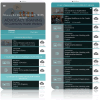Community health worker perspectives on advocacy: design-based research to develop a digital advocacy training course
- PMID: 38660355
- PMCID: PMC11039831
- DOI: 10.3389/fpubh.2024.1334279
Community health worker perspectives on advocacy: design-based research to develop a digital advocacy training course
Abstract
Introduction: While community health workers (CHWs) are well-positioned as health advocates, they frequently lack support and feel undervalued. Advocacy training may prepare CHWs to support communities better.
Methods: This study uses a design-based research approach to (1) explore how participation in curriculum-development workshops for a digital advocacy course influenced CHWs' (n = 25) perceptions of advocacy and (2) describe how CHW involvement shaped course development. Data were collected via five discussion groups and seven surveys over six months.
Results: Initially, the CHWs perceived themselves as community-advocates but not as self-advocates. They increasingly reflected on the merits of advocating for better working conditions and aspired to greater involvement in decision-making. CHWs reflected positively on their advisory role in shaping the course to improve content acceptability and validity.
Discussion: Training efforts to engage CHWs in advocacy must overcome systemic barriers and norms internalized by CHWs that deter them from reaching their full potential as advocates.
Keywords: CHWs; advocacy training; design-based research; digital training; health advocacy.
Copyright © 2024 Job, Johnston, Westgate, Skinner, Ward, Ballard and CHW Advocates Advisory Group.
Conflict of interest statement
The authors declare that the research was conducted in the absence of any commercial or financial relationships that could be construed as a potential conflict of interest.
Figures
Similar articles
-
Drugs for some but not all: inequity within community health worker teams during introduction of integrated community case management.BMC Health Serv Res. 2014;14 Suppl 1(Suppl 1):S1. doi: 10.1186/1472-6963-14-S1-S1. Epub 2014 May 12. BMC Health Serv Res. 2014. PMID: 25078968 Free PMC article.
-
Community health workers leading the charge on workforce development: lessons from New Orleans.J Community Health. 2014 Dec;39(6):1140-9. doi: 10.1007/s10900-014-9869-z. J Community Health. 2014. PMID: 24705703
-
Predictors and a framework for fostering community advocacy as a community health worker core function to eliminate health disparities.Am J Public Health. 2013 Jul;103(7):e67-73. doi: 10.2105/AJPH.2012.301108. Epub 2013 May 16. Am J Public Health. 2013. PMID: 23678904 Free PMC article.
-
Sources of community health worker motivation: a qualitative study in Morogoro Region, Tanzania.Hum Resour Health. 2013 Oct 10;11:52. doi: 10.1186/1478-4491-11-52. Hum Resour Health. 2013. PMID: 24112292 Free PMC article. Review.
-
Community health workers at the dawn of a new era: 9. CHWs' relationships with the health system and communities.Health Res Policy Syst. 2021 Oct 12;19(Suppl 3):116. doi: 10.1186/s12961-021-00756-4. Health Res Policy Syst. 2021. PMID: 34641902 Free PMC article. Review.
References
MeSH terms
LinkOut - more resources
Full Text Sources



